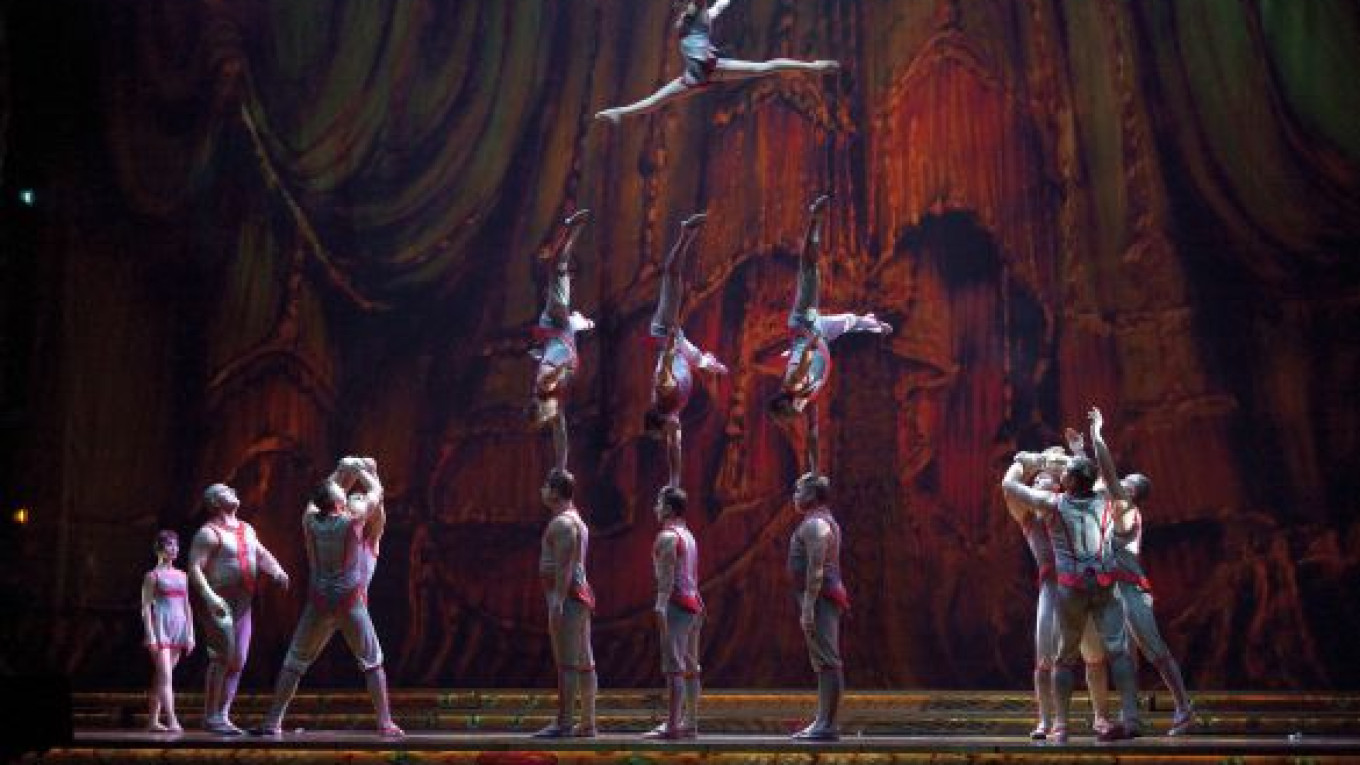The father and son who boosted Russian consumer freedom with global brands McDonald's and Coca-Cola are on a mission to do the same for cultural choice with Cirque du Soleil's Zarkana show.
George Cohon battled Communist bureaucrats for 14 years to bring Big Macs to the Soviet Union in 1990 just before its collapse. His son Craig started building Russia's first Coca-Cola plant after 18 months of talks. It took less than a year for him to get Kremlin officials to agree to Zarkana performing inside the country's 500-year-old seat of power.
The acrobatic rock opera is described by its creators as a cross between arcane and bizarre, with jugglers and a high-flying spider woman. It debuted in June at the Radio City Music Hall in New York and is due to feature at the Kremlin Palace from February 2012 — the first three-month stretch in its history.
The palace, built in 1961, seats about 6,000 and has hosted Elton John, heavy metal band Scorpions and Michael Flatley's "Lord of the Dance."
The Montreal-based circus, which has become a global franchise with permanent shows in Las Vegas and elsewhere, may be helped by its Russian links. Its co-founder Guy Laliberte, a former fire-eater, paid Russia $35 million to shoot off to the International Space Station in 2009 as a tourist.
Cirque has invested 1.2 billion rubles ($43 million) in Russia since 2008, selling more than 500,000 tickets in two years. It is spending $57 million on running the Zarkana show in New York and Moscow. Cirque plans to invest $50 million more to give it a permanent presence in Russia. The Cohons own 25 percent of the circus's Russian venture.
"We are not coming here to take on the Russian circus, we are expanding the market of choice," says Craig Cohon, 48, sipping tea in the Cirque du Soleil office in central Moscow, where 25 people coordinate business including this year's Saltimbanco show that will run in October and November in four cities.
Cohon is in talks with the Mayor's Office to set up a school and a regular venue for the show. Cirque du Soleil started from a group of 20 street performers in 1984 and counts more than 1,500 performing artists from about 50 different countries. It is aiming to reach $1 billion in revenue this year, according to founder and 80 percent owner Laliberte.
President Dmitry Medvedev's office helped to get the Cirque plan approved, Cohon says.
"The leaders of this country are getting very clear on what their local and international strategy is," Cohon says. "They realize they can't be a BRIC country and only supply raw materials to China."
Looking to wean its economy from dependence on oil and gas, the Russian government is developing technology, with its own version of a Silicon Valley at Skolkovo. It is pushing to revive sports by hosting the 2014 Winter Olympics, ice hockey's 2016 World Championship and football's 2018 World Cup, as well as an annual Formula 1 car race.
"The last pillar is culture," Cohon says. "It is a whole wealth of talent here that can get integrated into the rest of the world that hasn't necessarily been allowed to blossom."
His father, American-born Canadian George Cohon, opened the first McDonald's on Moscow's Pushkin Square — with 30,000 people lining up — in January, 1990. He initially discussed the idea with the Soviet delegation at the Montreal Olympics and lost count of the number of approvals needed. McDonald's now has 277 Russian restaurants and employs more than 26,000 people. The go-ahead for the Moscow Coca-Cola plant needed 21 signatures, Cohon says, and Cirque du Soleil did it with just one.
Cohon, who has also worked in India and China, says he is a great believer in Russia, even though it is rated the world's most corrupt major economy by Berlin-based Transparency International's 2010 perception index.
Cohon also says neither he nor his father has ever been asked for a bribe to facilitate business in Russia, where citizens pay bribes totaling $300 billion a year, according to the National Anti-Corruption Committee.
Cultivating relationships helped Cohon become the first non-Soviet to buy an apartment in 1990, and he said the law needed to be rewritten for that.
"I stayed up till two in the morning with the Minister of Finance's team," he says. "It led to investment of several hundred million dollars to build a factory."


